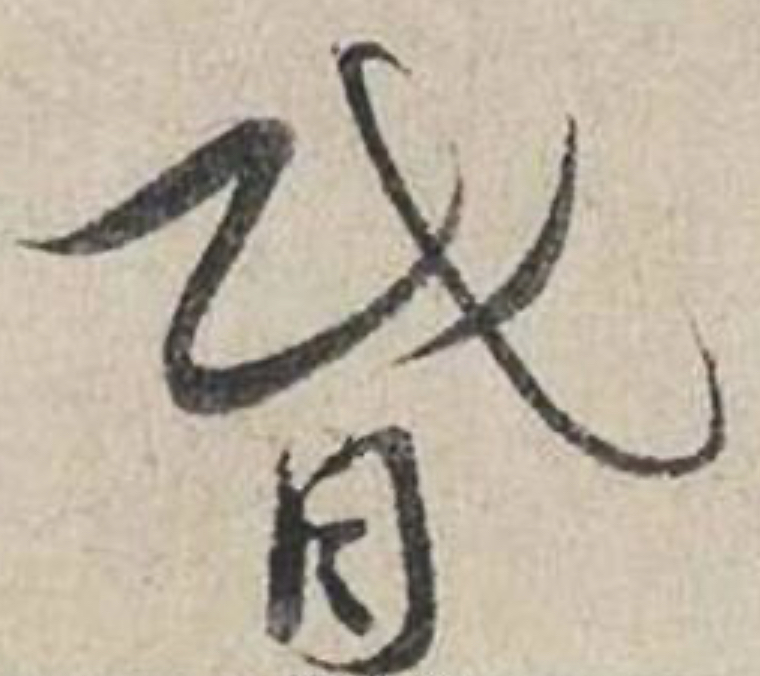Xi Jinping’s Empire of Tedium
Appendix LVIII
蠅營狗苟
In 2024 it will be a hundred years since Lu Xun published ‘The Shadow’s Farewell’ 影的告別, a darkly mesmeric prose-poem about the dilemmas of the age. The somnolent narrator of the piece rejects the compromises demanded of everyday tedium, while refusing also the allure of empty promises and delusional hope.
In our series Xi Jinping’s Empire of Tedium, we quote from ‘The Shadow’s Farewell’ to mark the end of 2023 and, along with ‘You Want It Darker’, the title track of Leonard Cohen’s last studio album, a poem by Jiang He and the art of Lao Shu, we anticipate the year 2024.
***
There is something about Heaven that displeases me; I do not wish to go there.
There is something about Hell that displeases me; I do not wish to go there.
And there is something about your future Golden Age that displeases me too; I do not wish to go there either.
有我所不樂意的在天堂里,我不願去;有我所不樂意的在地獄里,我不願去;
有我所不樂意的在你們將來的黃金世界里,我不願去。
What displeases me is you.
然而你就是我所不樂意的。
— from Lu Xun, ‘The Shadow’s Farewell’ 影的告別, 1924
***
It is four decades since I sat at my mother’s dining room table in Murrumbateman, rural New South Wales, composing an account of my understanding of the limits of China’s reforms. Published in two parts under the title ‘China Blames the West for “Cultural Pollution” ’, that essay saw in the Communist Party’s purge of the Marxist humanists in its ranks and the renewed attack on Western values, a warning about what was to come. And come it did — in 1987, 1989 and in the mini cultural, academic and political purges up to 2011.
In March 2011, when addressing the National People’s Congress, Vice-premier Wu Bangguo excoriated anew Western concepts of human value, democracy and freedom. It was an adumbration of the Xi Jinping era.
My 1983 essay on the Spiritual Pollution Campaign was only a distraction from my main concern at the time. Earlier that year, at the encouragement of Pierre Ryckmans (Simon Leys), I had returned to Australia after nearly a decade in mainland China, Hong Kong and Japan, to pursue a doctorate under his supervision. I was interested in what I would subsequently call The Other China, that is the cultural ideas, creators and history that existed, and sometimes even flourished, in the shadow of the political and social dramas of modern China. The resulting thesis eventually appeared under the title An Artistic Exile (2002).
The Other China was also featured in Seeds of Fire: Chinese Voices of Conscience (1986), a book that I compiled with John Minford that was about both hope and foreboding in post-Mao China. We used ‘The Shadow’s Farewell’ as the ‘envoi’ or leave-taking at the end of Seeds.
Three decades later, I prefaced Cutting a Deal with China, the speech I made to launch China Heritage in December 2016 with Lu Xun’s ‘The Shadow’s Farewell’. As 2023 draws to an end, it reflects a more universal sense of dread and foreboding. Doom and gloom will not, however, overshadow our future.
Although we will continue to add material to Xi Jinping’s Empire of Tedium, a series launched in early 2022, the focus of our attention will be The Tower of Reading, a project that highlights what we call ‘intersections with eternity’ — essays, poems and art from the Chinese tradition that speak both to the modern condition as well as to broader humanistic concerns.
***
In a Word —苟 gǒu
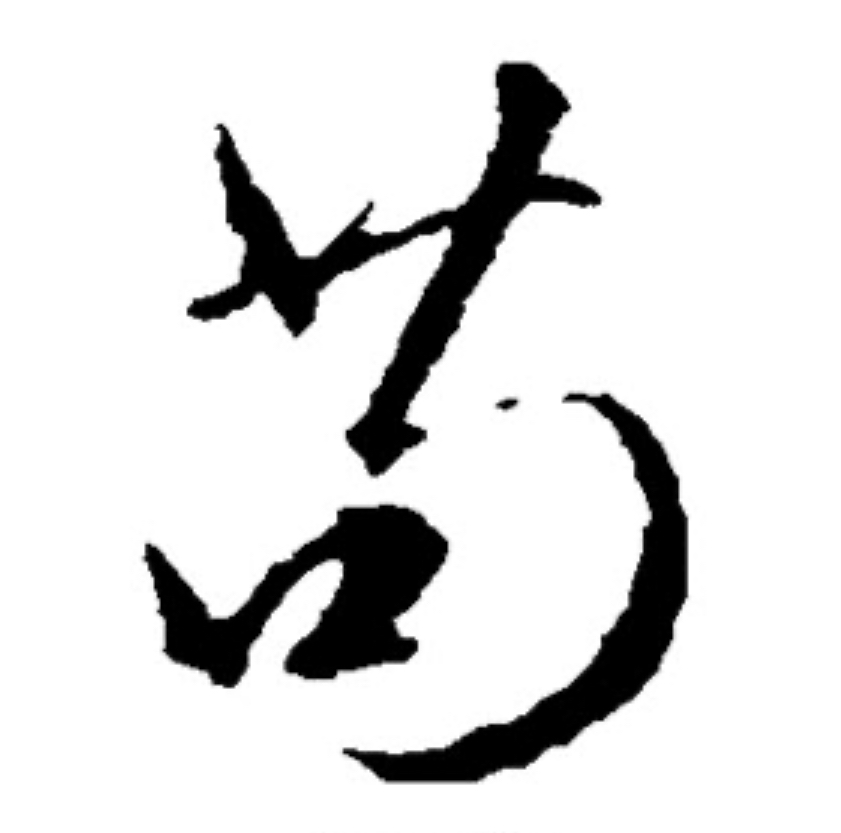
***
Identifying the ‘word of the year’, neologisms or expressions that characterise the previous twelve months is an annual exercise favoured by media outlets throughout the world. China is no different. Since lexical listicles produced by the mainstream media are, by their very nature, upbeat, we recommend the compilations of independent-minded glossarians
SlowChinese, a project run by Andrew Methven that has its finger on the linguistic pulse of the People’s Republic, suggested the expression ‘calling a rat a duck’ 指鼠為鴨 was particularly noteworthy in 2023. ‘It was’, Methven noted, ‘coined following a food safety scandal at a college canteen when a student found a rat’s head in his soup. The college, local police, and government insisted it was a duck’s neck.
‘The new phrase is now widely used to express a distrust of the authorities.’
The contemporary expression ‘calling a rat a duck’ 指鼠為鴨 is a reworking of ‘calling a deer a horse’ 指鹿為馬, an ancient phrase that still means purposeful obfuscation or bare-faced dissemblance. It comes from the Chronicles of the Grand Historian 史記, composed by Sima Qian in the Han dynasty, as does our own choice of term of the year, which is 苟 gǒu. This term features in the Chinese rubric of our farewell to 2023, 蠅營狗苟 yíng yíng gǒu gǒu, that is, to keep a low profile while trying to exploit a situation for one’s own benefit.
Although 蠅營狗苟 yíng yíng gǒu gǒu appear in ‘Farewell to Poverty’ 送窮文, a rather drole essay by the Tang scholar-official Han Yu, 苟 gǒu and 苟活 gǒu huó had long enjoyed literary prominence after having appeared in Sima Qian’s ‘Letter to Ren An’ 報任安書, where the maligned and hard-pressed historian declared that:
所以隱忍苟活,幽於糞土之中而不辭者,恨私心有所不盡 …
The reason I suffered in silence and live on in disgrace, refusing to retreat even when mired in filth, was that I would have hated not to fully express what I held in my heart.
— translated in Stephen Durrant et al, The Letter to Ren An & Sima Qian’s Legacy, University of Washington Press, 2018, p.28
Thus, 苟活 gǒu huó means to ‘live on despite one’s dire circumstances’ or, in modern parlance, ‘to just get by’, or ‘live under the radar’. In China today, the ancient expressions 苟活 gǒu huó, as well as 苟且 gǒu qiě, as in 苟且偷生, ‘to simply get by unnoticed’ and 随俗苟且 suí sú gǒu qiě are all still in everyday use. The expression 苟且 gǒu qiě also appears in Viral Alarm, Professor Xu Zhangrun’s powerful critic of Xi Jinping’s mishandling of the Covid-19 epidemic in early 2020, in which he wrote:
… 豈能「豬一般的苟且,狗一樣的奴媚,蛆蟲似的卑污」?!
… how can we let ourselves continue to “survive no better than swine; fawn upon the power-holders like curs; and live in vile filth like maggots”?!
A variation of the expression 蠅營狗苟 yíngyíng gǒugǒu also featured in Land of the Rakshasas & the Sea Market, the hit song of the northern summer of 2023. For more on this subject, see The Art of Survival in the Age of Xi Jinping, Chapter 19 in Xi Jinping’s Empire of Tedium, 4 May 2023.
Although it is a personal favourite, 苟gǒu does not feature in any mainstream lists of words of the year. For other popular words of 2023 and collections that reflect the Xi Jinping era more broadly, see:
- China Digital Times Lexicon, 20th Anniversary Edition, December 2023 (originally the Grass Mud Horse Lexicon)
- The CMP Dictionary, China Media Project
- The Language of Now: China’s Best Internet Slang in 2023, Sixth Tone
- China’s Trending Terminology: Top 25 Buzzwords and Catchphrases of 2023, What’s on Weibo, 31 December 2023
- Chinese buzzwords for 2023, Language Log, 6 December 2023
Writing in Language Log, Victor Mair says of the plodding efforts of the Shanghai based 咬文嚼字 yǎo wén jiáo zì, a linguistics/ socio-political publication, to come up with a list of popular terms that reflect ‘positive energy’ that they amount to:
A breathtaking tour of the Chinese WOTY scene for 2023. I think that the Yaowen Jiaozi editors who had to present these terms to the public were under a lot of pressure to convey the excitement they engendered.
Compared to Oxford University Press’s sexy “rizz” (short for “charisma”) and other lively WOTYs of the English-speaking world, one might well think that English and Chinese occupy two different linguistic universes.
The gaping chasm between New China Newspeak and the ‘parole’ of The Other China also highlights the different, although intertwined, linguistic universes of Chinese.
***
On 18 December 2023, we witnessed with grim horror the first day of the show trial of Jimmy Lai, a man who has come to symbolise the death of free expression in Hong Kong. Then on 26 December, we acknowledged the 130th birthday of Mao Zedong, a man whose spectre continues to haunt China. In 2016, Xu Zhangrun summed up the High Reform era as 毛體鄧用 — the Mao-Liu party-state adapted to contemporary needs by Deng. Since then 毛體習用 — the old Mao-Liu party-state updated by Deng and repurposed by Xi — has been the order of the day.
The 28th of December was Liu Xiaobo’s birthday. It also happened to be the tenth anniversary of Xi Jinping’s meal at the Qingfeng Steamed Bun Inn in Beijing. That meal, a political performance staged to demonstrate the leader’s frugality and common touch, gave rise to some of the most popular satirical nicknames 綽號 used to describe Xi. They include Dumpling Xi 習包子, Emperor Dumpling 包子帝 and Emperor Qingfeng 慶豐帝. Subsequently, when the Chinese Constitution was revised in March 2018, making it possible for Xi Jinping to enjoy ‘terminal tenure’, the move was mocked in private with a double-entendre: ‘the dumpling spilt its insides/ Dumpling Xi revealed his constitutional ambitions’ 包子露餡/ 包子露憲。
***
This farewell to 2023 is dedicated to the memory of 圈兒 and in gratitude to the companionship of 虎皮牆, my cats.
— Geremie R. Barmé
Editor, China Heritage
31 December 2023
New Year’s Eve
***
Recommendations:
- 2023年,我的“不明白”,《不明白播客》,EP-079,2023年12月30日
- “不知道什麼能說什麼不能說的時候,其實你的恐懼是被無限放大的”……2023年度人物:在刀尖上跳舞的脫口秀演員,《中國電子時代》,2023年12月30日
- ‘It’s only the end of the beginning’ — Teacher Li on Blank Pages, Li Keqiang, Snowflakes & Monsters, 18 December 2023
- Leonard Cohen, Democracy & The Future — 3 November 2020, China Heritage, 3 November 2020
Looking Out at the Snow
老樹
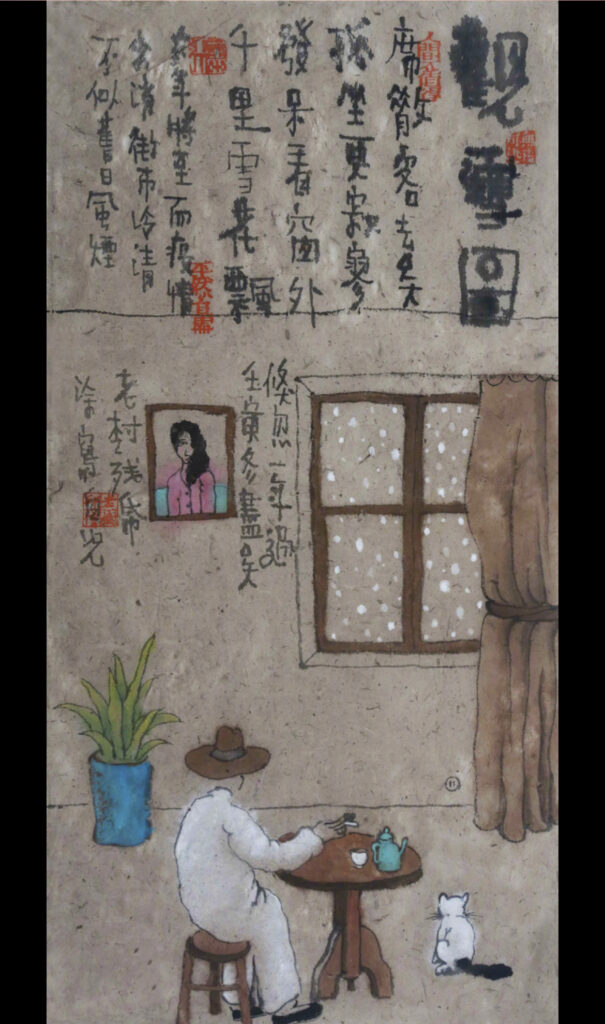
The guests have long gone and
In my loneliness I
Stare out blankly at a vast
Landscape of fluttering snow
— Though a new year approaches Covid is still with us and things are eerily quiet, so different from the past.
Another year has passed, as if in a flash, and I’ve spattered some paint on an old scrap of paper, just for something to do [dated winter 2022]
***
You Want It Darker
Leonard Cohen
If you are the dealer, I’m out of the game
If you are the healer, it means I’m broken and lame
If thine is the glory, then mine must be the shame
You want it darker
We kill the flameMagnified, sanctified
Be the holy name
Vilified, crucified
In the human frame
A million candles burning
For the help that never came
You want it darkerHineni, hineni
I’m ready, my LordThere’s a lover in the story
But the story’s still the same
There’s a lullaby for suffering
And a paradox to blame
But it’s written in the scriptures
And it’s not some idle claim
You want it darker
We kill the flameThey’re lining up to prisoners
And the guards are taking aim
I struggle with some demons
They were middle class and tame
I didn’t know I had permission
To murder and to maim
You want it darkerHineni, hineni
I’m ready, my LordMagnified, sanctified
Be the holy name
Vilified, crucified
In the human frame
A million candles burning
For the love that never came
You want it darker
We kill the flameIf you are the dealer, let me out of the game
If you are the healer, I’m broken and lame
If thine is the glory, mine must be the shame
You want it darkerHineni, hineni
Hineni, hineni
I’m ready, my Lord
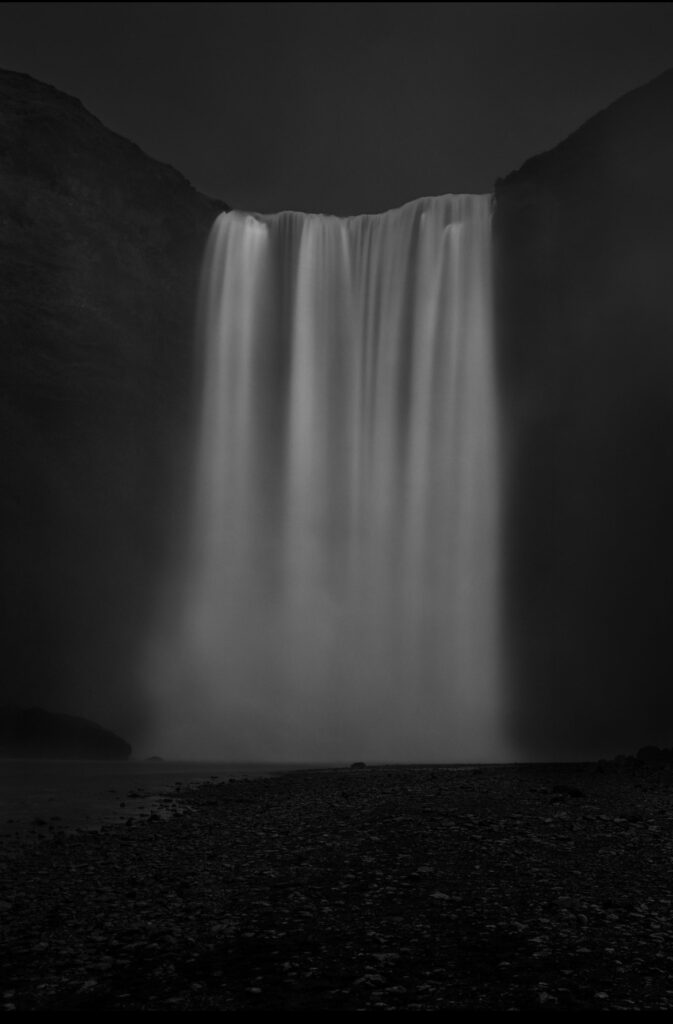
***
Singing into the Dark
黑之歌
This sleepless hour
Knocks a hole in the night
Darker than night itself
Dreams eclipsed
A halo of darkness
The pitch black
Gravid, deep
Crawling in
Swimming the depths
Tail wagging
Deep into the earth
The day is not this deep
Daytime knows not this darkness
So black it befuddles
Such blackness agitates
There’s blackness hidden
In the black
A gravid black
A darker, deeper black.
一小時失眠
給夜打了個洞
比夜還黑
夢的日蝕
帶光環的黑
圓的黑
深的黑
鑽進去
向下游動
擺著尾巴
向地球深處
白天做不到的深
白天做不到的黑
黑得入迷
黑得抖動
是黑中隱藏的
黑
圓的黑
更深的黑
— Jiang He, 20 December 2023
江河,2023年12月20日
***
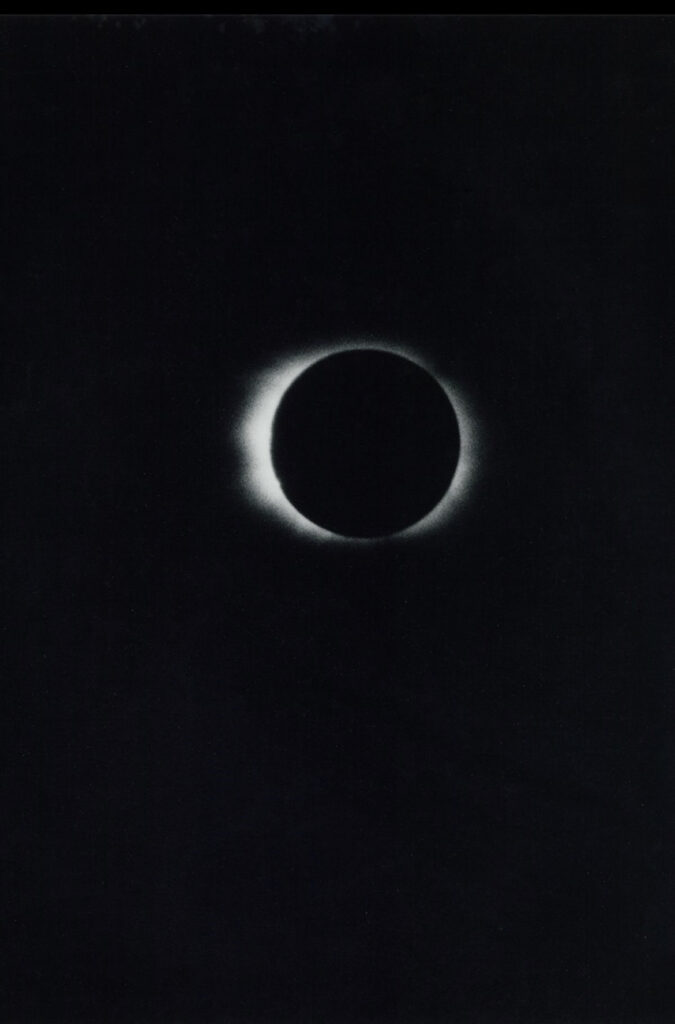
***
Everybody Knows
Everybody knows that the dice are loaded
Everybody rolls with their fingers crossed
Everybody knows the war is over
Everybody knows the good guys lost
Everybody knows the fight was fixed
The poor stay poor, the rich get rich
That’s how it goes
Everybody knowsEverybody knows that the boat is leaking
Everybody knows that the captain lied
Everybody got this broken feeling
Like their father or their dog just died
Everybody talking to their pockets
Everybody wants a box of chocolates
And a long-stem rose
Everybody knows
***
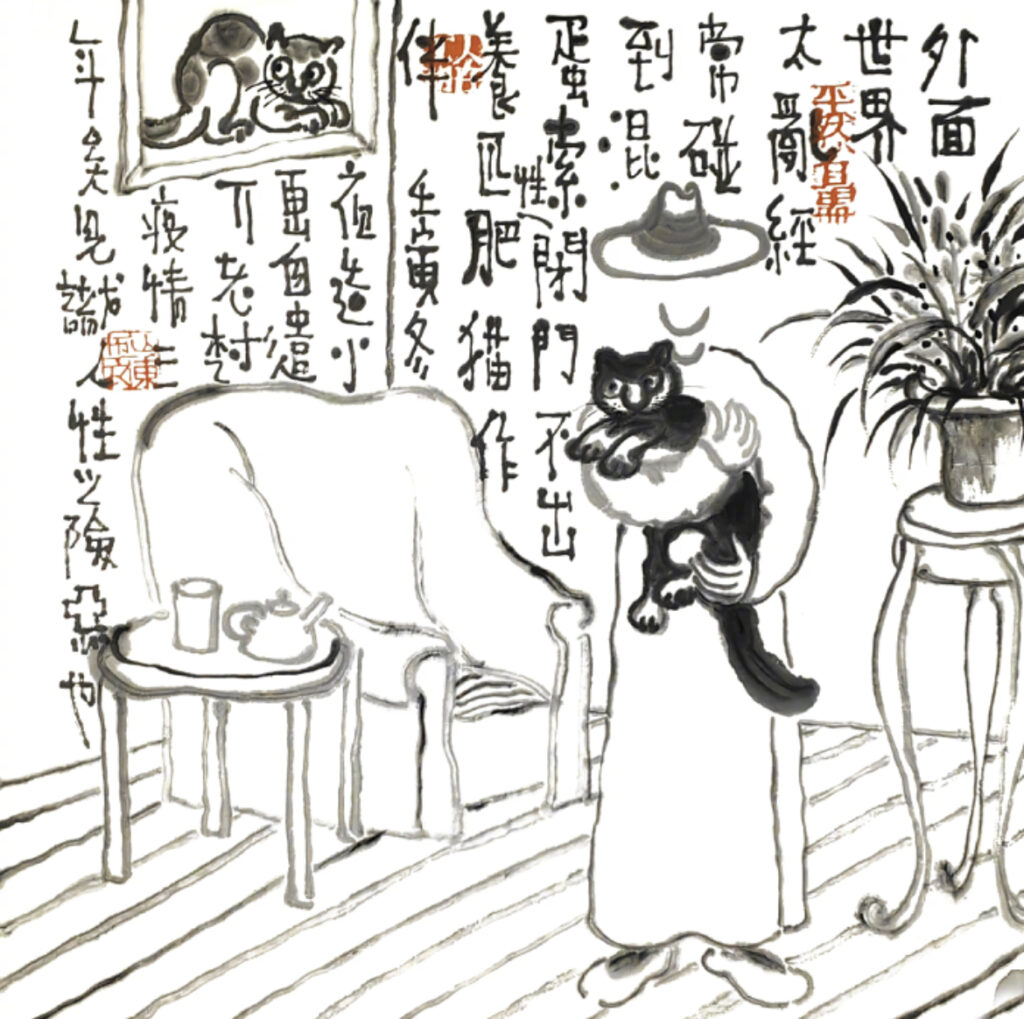
It’s a nightmare out there,
assholes wherever you go.
I’ll just hang at home and
enjoy the company of a cuddly cat.
— Lao Shu, painted to while away a winter’s night, 2022.
Three years of Covid revealed the villainy that lurks in people’s hearts.
***
